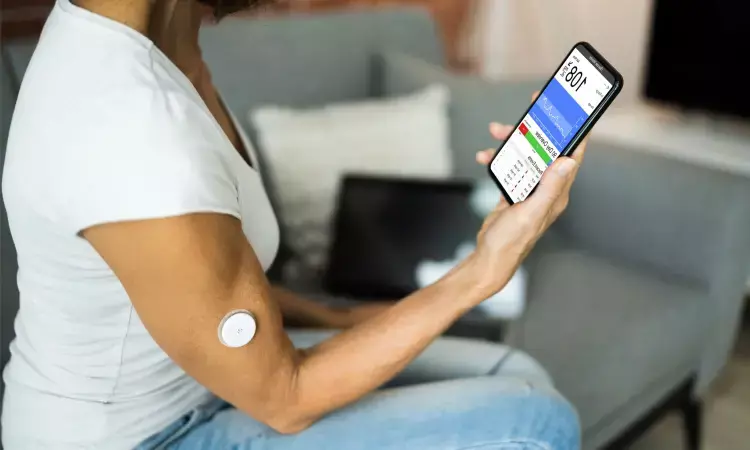- Home
- Medical news & Guidelines
- Anesthesiology
- Cardiology and CTVS
- Critical Care
- Dentistry
- Dermatology
- Diabetes and Endocrinology
- ENT
- Gastroenterology
- Medicine
- Nephrology
- Neurology
- Obstretics-Gynaecology
- Oncology
- Ophthalmology
- Orthopaedics
- Pediatrics-Neonatology
- Psychiatry
- Pulmonology
- Radiology
- Surgery
- Urology
- Laboratory Medicine
- Diet
- Nursing
- Paramedical
- Physiotherapy
- Health news
- Fact Check
- Bone Health Fact Check
- Brain Health Fact Check
- Cancer Related Fact Check
- Child Care Fact Check
- Dental and oral health fact check
- Diabetes and metabolic health fact check
- Diet and Nutrition Fact Check
- Eye and ENT Care Fact Check
- Fitness fact check
- Gut health fact check
- Heart health fact check
- Kidney health fact check
- Medical education fact check
- Men's health fact check
- Respiratory fact check
- Skin and hair care fact check
- Vaccine and Immunization fact check
- Women's health fact check
- AYUSH
- State News
- Andaman and Nicobar Islands
- Andhra Pradesh
- Arunachal Pradesh
- Assam
- Bihar
- Chandigarh
- Chattisgarh
- Dadra and Nagar Haveli
- Daman and Diu
- Delhi
- Goa
- Gujarat
- Haryana
- Himachal Pradesh
- Jammu & Kashmir
- Jharkhand
- Karnataka
- Kerala
- Ladakh
- Lakshadweep
- Madhya Pradesh
- Maharashtra
- Manipur
- Meghalaya
- Mizoram
- Nagaland
- Odisha
- Puducherry
- Punjab
- Rajasthan
- Sikkim
- Tamil Nadu
- Telangana
- Tripura
- Uttar Pradesh
- Uttrakhand
- West Bengal
- Medical Education
- Industry
Continuous Glucose Monitoring Shows Promise in Managing Type 2 Diabetes, Reveals Comprehensive Study

USA: Continuous glucose monitoring (CGM) emerges as a beacon of hope in the battle against type 2 diabetes mellitus (T2DM), as per a recent systematic review and meta-analysis of randomized controlled trials. The study, conducted by a team of researchers, delves into CGM's effectiveness in enhancing metrics of glycemic control among individuals grappling with T2DM.
The study published in The Journal of Clinical Endocrinology & Metabolism revealed that continuous glucose monitors (CGMs) or flash glucose monitors (FGM) use led to a statistically significant decrease in A1C for adults with type 2 diabetes.
"Our analyses showed that initiation of CGM led to a modest but significant decline in HbA1c of 0.32% among patients with T2DM," the researchers reported. They note that declines in HbA1c were similar for both rt-CGM and FGM, however, there was a trend for improvements in other metrics of glucose control that favored rt-CGM over self-monitoring blood glucose (SMBG).
Stacey Uhl, ECRI, Plymouth Meeting, PA, USA, and colleagues aimed to provide a systematic review and meta-analysis synthesizing the findings of randomized controlled trials (RCTs) of CGMs in managing adults with type 2 diabetes on glucose control and clinical outcomes.
For this purpose, the researcher searched the online databases for RCTs that assessed the effectiveness of FGM or real-time CGM (rt-CGM) in adults with T2DM that reported on at least 1 of the following outcomes: time in hyperglycemia, time in range, hemoglobin A1c (HbA1c), or time in hypoglycemia. The certainty of evidence for primary outcomes was assessed using the GRADE approach.
The researchers reported the following findings:
- The review included fourteen RCTs assessing CGM, with 825 patients in 9 RCTs using rt-CGM and 822 in 5 RCTs using FGM.
- Moderate certainty of evidence indicated that the use of CGM had a modest but statistically significant reduction in HbA1c levels of about 0.32%.
- The analyses of each device type showed similar reductions in HbA1c (0.34% and 0.33%, respectively, for rt-CGM and FGM), with trends for improvement in other glucose metrics favoring rt-CGM over self-monitored blood glucose.
Flash CGM and rt-CGM led to modest but statistically significant reductions in HbA1c among individuals with T2DM, with little heterogeneity in the results. However, the duration of the included RCTs was relatively short, and few studies reported on important clinical outcomes, such as emergency department use, adverse events, or hospitalization.
"There is a need for longer-term studies to determine if the short-term improvements in glucose control lead to improvements in clinically important outcomes," the researchers wrote.
Reference:
Uhl, S., Choure, A., Rouse, B., Loblack, A., & Reaven, P. (2024). Effectiveness of Continuous Glucose Monitoring on Metrics of Glycemic Control in Type 2 Diabetes Mellitus: A Systematic Review and Meta-analysis of Randomized Controlled Trials. The Journal of Clinical Endocrinology & Metabolism, 109(4), 1119-1131. https://doi.org/10.1210/clinem/dgad652
Dr Kamal Kant Kohli-MBBS, DTCD- a chest specialist with more than 30 years of practice and a flair for writing clinical articles, Dr Kamal Kant Kohli joined Medical Dialogues as a Chief Editor of Medical News. Besides writing articles, as an editor, he proofreads and verifies all the medical content published on Medical Dialogues including those coming from journals, studies,medical conferences,guidelines etc. Email: drkohli@medicaldialogues.in. Contact no. 011-43720751


